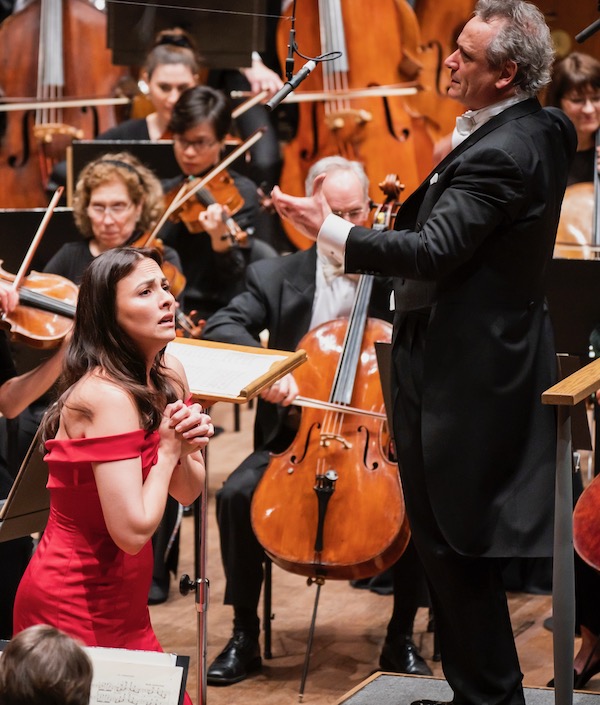In belated Philharmonic debut, Langrée draws exquisite results

Louis Langrée is no stranger to David Geffen Hall. He is a familiar face around Lincoln Center, having served as music director of the Mostly Mozart Festival since 2003, and cementing his place as one of the cultural leaders of New York summers in the process.
It was a little jarring, then, to look down at a program in that auditorium and see the word “debut” next to his name, but so it was: on Thursday night he made a strong first appearance with the New York Philharmonic, leading a shining program of Debussy, Ravel, and Scriabin.
The program opened with a Debussy evergreen, the Prélude à l’après-midi d’un faune. Langrée achieved a perfect composition of sound through an exquisite balancing of the orchestra, which would be a distinguishing feature of his conducting throughout the night. He drew a warm, orange glow out of the Philharmonic and maintained an easy yet consistent but pace that built beautifully towards large, swelling sighs from the entire ensemble.
More Debussy followed, with the three Nocturnes. “Nuages” showed an overall dreaming quality while hinting at a hidden, more sinister strain in the close-drawn murkiness of the tonality, with little snatches of the “Dies Irae” plainchant poking through the chilly mists of the sotto voce strings. “Fêtes” brought ringing excitement, with precision in the interlocking rhythms, quickly passing the running figures from one section to the next in a lively dance that never lost control.
“Sirènes” was the most striking of the three, as the Philharmonic was joined by the Women’s Chorus from the Juilliard School, who found a pure, shining sound in their vocalise. Breaking in as though through a cloud in the opening bars, their haunting melody quickly turned hypnotic, sitting over the simple slurred figures of the strings. Langrée here controlled the levels brilliantly, swelling up to forte and back to piano as precisely as though he were turning a dial.
Isabel Leonard was the evening’s soloist in Ravel’s Shéhérazade. In this brief song cycle, the richness of her tone was on display from the start of “Asie,” showing a colorful middle voice with a consistency like melted chocolate. Her tightly shaped phrases added expressive depth to her singing, often stretching through the top of a line or lingering on its end. Leonard has a perfectly natural feel for French diction, which gives her a variety of choices in her delivery: “Asie” cycled through soft wonder, tender longing, and fierce, vivid declamation, while the orchestra captured the exotic fascination of Ravel’s writing with a pale, bright tone.
The innocent light in Leonard’s mezzo-soprano at the start of “La flûte enchantée” quickly moved back into her shady middle voice, drawing a subtle contrast with the ethereal flute solo by Robert Langevin. In “L’indifférent,” Leonard commanded attention with the soft languor of her singing and added color to her interpretation by toying with the text.
The evening closed with Scriabin’s Le Poème de l’extase. Langrée highlighted the spacious writing of the opening, giving Scriabin’s bright, floating sounds plenty of room to breathe. He impressed with his ability to capture the many characters of the music: from the the languid reveries and impish dances to the lovely, intimate chamber interludes and huge climaxes roaring with energy. This is a piece that builds to more than one high point, and Langrée never faltered in these moments, growing the rich, burning intensity of the orchestra into blaring chaos, and finally a sustained burst of light at the conclusion.
The program will be repeated 8 p.m. Saturday and 7:30 p.m. Tuesday at David Geffen Hall. nyphil.org